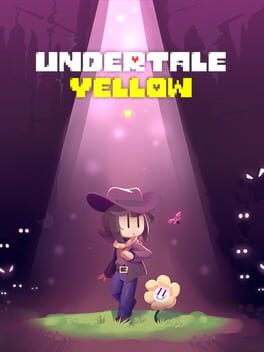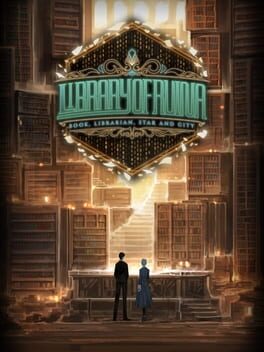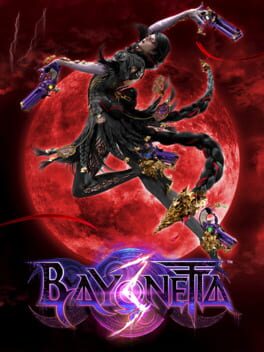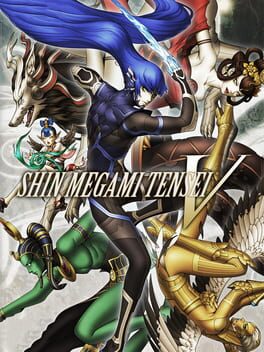Toa
38 Reviews liked by Toa
Undertale Yellow
2023
Undertale Yellow
2023
This game spends a lot of time meandering in a way that Undertale probably also does, but without Toby Fox's writing and Compositions. Trying to emulate those facets of Toby Fox's work may just not be possible and I really started to feel the weight of the constant text and repetitive enemies. Characters don't really gain any attachment early on so it really doesn't feel all that interesting for a while. Luckily I felt the story picks up by the end and it left a good final impression. I got the Pacifist ending and I think it slotted in next to the story of Undertale (uh oh) nicely.
There are some character designs that aren't bad but feel out of place to me. I don't think they're super far fetched but their presence in combination with the fact that it's a fan game makes it more noticeable. I hope some others will understand what I mean.
I'll likely try some extra endings.
Update: Did all endings. Genocide final boss was borderline impossible before the 1.1 patch so I had to update specifically for it. I had to manipulate my save because there's a point in the last area of genocide where if you cross into a room you can no longer kill everything. Really lame.
Non-pacifist routes didn't really change my opinion of the game overall. The Flowey fight was interesting but wasn't as cool as Omega Flowey, but to be fair it shouldn't be.
There are some character designs that aren't bad but feel out of place to me. I don't think they're super far fetched but their presence in combination with the fact that it's a fan game makes it more noticeable. I hope some others will understand what I mean.
I'll likely try some extra endings.
Update: Did all endings. Genocide final boss was borderline impossible before the 1.1 patch so I had to update specifically for it. I had to manipulate my save because there's a point in the last area of genocide where if you cross into a room you can no longer kill everything. Really lame.
Non-pacifist routes didn't really change my opinion of the game overall. The Flowey fight was interesting but wasn't as cool as Omega Flowey, but to be fair it shouldn't be.
Lies of P
2023
I just wish it was a bit less linear.
Lies of P was an amazing, brutal, and satisfying experience. I've seen some people complaining about the gameplay and the parry system, however, I do believe they should just get good. It's not THAT hard, you're just playing like it's Sekiro while the game is, in fact, NOT Sekiro. Try playing it like Lies of P, get to understand the parry and dodge systems, it's really satisfying when you get used to it.
Lies of P was an amazing, brutal, and satisfying experience. I've seen some people complaining about the gameplay and the parry system, however, I do believe they should just get good. It's not THAT hard, you're just playing like it's Sekiro while the game is, in fact, NOT Sekiro. Try playing it like Lies of P, get to understand the parry and dodge systems, it's really satisfying when you get used to it.
Library of Ruina
2021
Library of Ruina
2021
Library of Ruina
2021
I think what generally strikes me first about Ruina, when reflecting, is scale and balance. Most of it comes from sheer awe, jumping from LobCorp this whole work has a stark amount of awareness of the ramifications of LobCorp, while also choosing to make an ambitious goal to balance so so so much more on top. And yet, the scales do not tip over, the further I mulled over and dived into things, the more everything seems awfully well set. Lot of flowery words to say that Project Moon has read a significant amount of literature between games and has an incredible amount more to say AND manages to integrate it perfectly, stretching my use of the word 'ludonarrative' to its absolute limit.
Ruina runs out the gate dismantling the 'hero' of the prior story, burning its idea of redemption into beautiful flame before trying to work beyond him. It keeps the hands of librarians that followed him, resolute in their ways, alongside villains seeking vengeance, joining together against the systems that have confined them, constructing a tower of babel built upon lives hoisted out of the city, justified in the name of 'fairness'. Watch along with them as the city moves in clockwork, these gears set by hypercapitalist systems that turn along people until they are crushed under the metal and spat out as ground together puppets. Reprieve only in the hopes of the little bits of light that people cling to to try to change, sometimes ending up with distorted selves trying desperately to conduct their own symphony, until all of us self realize, progressing beyond the means by which defines human, gender, creed into something more. Full Self-Actualization, Manifestation, capture your E.G.O. to build your future.
It's all explored in intense clashes! Use cards you pull from the light you take, then spread them out into tactics that run an intense ebb and flow on the battlefield. As you stack the shelves with every story you face and people you brutalize, the potential of your use of this knowledge flies sky-high, until you've made 'decks' that swallow the next set of fights with pinpoint precision. Even if you were a master deckbuilder you still have to adapt though. Solve the puzzle that matches each new patron's pscyhe, or be forced to retool from the pushed over house of cards. Every level jump in reputation brings in a whole area of complexity that gives you more immense freedom, with the caveat that the game pulls not a single punch for you to learn it. You'll be walled over and over until fundamentals are rock solid, pushed into an understanding of the ways of the city.
The leftover roots of the corporation that stand in ashes beneath the spine of the library throw you into even stronger, more complex puzzles, boss fights that adopt the abnormalities' story directly into turn by turn gameplay. Then reaching further, becoming thorough contextualization for the characters, then RE contextualizing across central theming. The Kabbalah's Sephirot and christian allegory returns with a much more complicated and personal base that transcends the story into touching on the baseline recognition of compassion and empathy, down to fighting anthromorphized struggles. Finish off by fighting demonic reflections of each lesson you've learned, until you're once again back at the base of the light, trying to look upon that all too familiar completely hopeless massive scope of depressing systems that oppress life, and going, This Can Change. Even those with the darkest masks over them can decide to break the cycle and seek to dismantle the machine. We can keep going while everything around us is 'distorted', and
Become Star of the City, Facing the Past, and Building the Future.
The journey's a long one but not one step is misplaced, not a moment wasted. You might have cause to grind to backfill your mistakes but the progression is always continuous. If you've got the head for it, you might even break it faster under your feet. The City is not without its weaknesses, after all!
But really, this is a rocketing experience, practically irreplaceable after much time to think over it. If you're not at least considering getting it what are you doing hereeee.
Ruina runs out the gate dismantling the 'hero' of the prior story, burning its idea of redemption into beautiful flame before trying to work beyond him. It keeps the hands of librarians that followed him, resolute in their ways, alongside villains seeking vengeance, joining together against the systems that have confined them, constructing a tower of babel built upon lives hoisted out of the city, justified in the name of 'fairness'. Watch along with them as the city moves in clockwork, these gears set by hypercapitalist systems that turn along people until they are crushed under the metal and spat out as ground together puppets. Reprieve only in the hopes of the little bits of light that people cling to to try to change, sometimes ending up with distorted selves trying desperately to conduct their own symphony, until all of us self realize, progressing beyond the means by which defines human, gender, creed into something more. Full Self-Actualization, Manifestation, capture your E.G.O. to build your future.
It's all explored in intense clashes! Use cards you pull from the light you take, then spread them out into tactics that run an intense ebb and flow on the battlefield. As you stack the shelves with every story you face and people you brutalize, the potential of your use of this knowledge flies sky-high, until you've made 'decks' that swallow the next set of fights with pinpoint precision. Even if you were a master deckbuilder you still have to adapt though. Solve the puzzle that matches each new patron's pscyhe, or be forced to retool from the pushed over house of cards. Every level jump in reputation brings in a whole area of complexity that gives you more immense freedom, with the caveat that the game pulls not a single punch for you to learn it. You'll be walled over and over until fundamentals are rock solid, pushed into an understanding of the ways of the city.
The leftover roots of the corporation that stand in ashes beneath the spine of the library throw you into even stronger, more complex puzzles, boss fights that adopt the abnormalities' story directly into turn by turn gameplay. Then reaching further, becoming thorough contextualization for the characters, then RE contextualizing across central theming. The Kabbalah's Sephirot and christian allegory returns with a much more complicated and personal base that transcends the story into touching on the baseline recognition of compassion and empathy, down to fighting anthromorphized struggles. Finish off by fighting demonic reflections of each lesson you've learned, until you're once again back at the base of the light, trying to look upon that all too familiar completely hopeless massive scope of depressing systems that oppress life, and going, This Can Change. Even those with the darkest masks over them can decide to break the cycle and seek to dismantle the machine. We can keep going while everything around us is 'distorted', and
Become Star of the City, Facing the Past, and Building the Future.
The journey's a long one but not one step is misplaced, not a moment wasted. You might have cause to grind to backfill your mistakes but the progression is always continuous. If you've got the head for it, you might even break it faster under your feet. The City is not without its weaknesses, after all!
But really, this is a rocketing experience, practically irreplaceable after much time to think over it. If you're not at least considering getting it what are you doing hereeee.
Bayonetta 3
2022
After 5 years of waiting, Bayonetta 3 is the exemplification of everything I love and hate about Platinum Games, combined with possibly the worst ending of any major video game release since Mass Effect 3.
Even the smallest QOL change of being able to select specific chunks of a chapter that, upon completion, will permenantly overwrite your score with your highest, is as much a blessing to the game as an even heavier overemphasis on setpieces are a curse. For as good as Bayonetta's core combat is, offering her even more weapons to use, and a demon summoning mechanic that's at least better than the second game's Infernal Climax, new character Viola feels half finished and like she was made from Bayonetta's usual katana moveset, with the most annoying parry in gaming history, and Jeanne's stealth sections feeling like a DS game from 2006 that'd be sitting on a Metacritic average of 27. For every fun boss fight with a great cutscene afterwards, there's another that's spent playing as a lumbering demon as the story limps towards a miserable conclusion that can best be described as "Devil May Cry 5 at home".
My disappointment is immense, and my faith in Platinum in a post Babylon's Fall world is forever shaken.
Even the smallest QOL change of being able to select specific chunks of a chapter that, upon completion, will permenantly overwrite your score with your highest, is as much a blessing to the game as an even heavier overemphasis on setpieces are a curse. For as good as Bayonetta's core combat is, offering her even more weapons to use, and a demon summoning mechanic that's at least better than the second game's Infernal Climax, new character Viola feels half finished and like she was made from Bayonetta's usual katana moveset, with the most annoying parry in gaming history, and Jeanne's stealth sections feeling like a DS game from 2006 that'd be sitting on a Metacritic average of 27. For every fun boss fight with a great cutscene afterwards, there's another that's spent playing as a lumbering demon as the story limps towards a miserable conclusion that can best be described as "Devil May Cry 5 at home".
My disappointment is immense, and my faith in Platinum in a post Babylon's Fall world is forever shaken.
Shin Megami Tensei V
2021
Coming off of my 2nd playthrough my thoughts about SMTV still feel like they aren't fully crystalized, but I will say I think it's a contender for best mainline SMT game.
The general exploratory structure of the game feels like what the devs have wanted to do since Nocturne, and it's the single biggest evolution the series has had since press-turn combat was introduced. The level design is dense, vertical, and satisfying in the way that the best dungeons in previous games were, but on a much larger scale. Most of my playtime here consisted of exploring to find all the mimans and do all the side quests, which scratches an itch that this series never really has for me. The feel of the exploration is aided immensely by the general atmosphere and soundtrack, which feels like it doubles down on all the parts of Nocturne I liked the most.
When I first saw the combat system for SMTV I was disappointed at the lack of the smirk system from SMT4(A). The smirk system added such a huge layer of complexity on top of the press-turn combat that I really couldn't imagine a new SMT game without it. Fortunately, SMTV's combat system still fares very well even without the smirk system. The addition of the magatsuhi gauge alongside a slew of minor system changes allows for an iteration of press-turn combat that feels very satisfying.
One of the main reasons for that satisfaction is how easy it is to fuse and customize demons in this entry. With the addition of reverse fusion and reverse-compendium fusion, alongside the essence system, you can spend hours tweaking your team of freaks to prepare you for any possible combat encounter. It rules, and now I can't imagine a future entry without the essence system, much like I couldn't imagine one without smirk.
The only part of the game I don't feel sticks the landing is the story. I won't go into spoilers here, but I will say character development across the board sucks. This was a gripe I also had with Nocturne as well, but I don't think there was any reason to follow in Nocturne's footsteps quite so much in this one area.
Overall, this is a really great game. If you like JRPGs at all you owe it to yourself to check this one out. Although I wouldn't blame you if you waited to play it at a higher resolution and framerate, cuz WOOF
The general exploratory structure of the game feels like what the devs have wanted to do since Nocturne, and it's the single biggest evolution the series has had since press-turn combat was introduced. The level design is dense, vertical, and satisfying in the way that the best dungeons in previous games were, but on a much larger scale. Most of my playtime here consisted of exploring to find all the mimans and do all the side quests, which scratches an itch that this series never really has for me. The feel of the exploration is aided immensely by the general atmosphere and soundtrack, which feels like it doubles down on all the parts of Nocturne I liked the most.
When I first saw the combat system for SMTV I was disappointed at the lack of the smirk system from SMT4(A). The smirk system added such a huge layer of complexity on top of the press-turn combat that I really couldn't imagine a new SMT game without it. Fortunately, SMTV's combat system still fares very well even without the smirk system. The addition of the magatsuhi gauge alongside a slew of minor system changes allows for an iteration of press-turn combat that feels very satisfying.
One of the main reasons for that satisfaction is how easy it is to fuse and customize demons in this entry. With the addition of reverse fusion and reverse-compendium fusion, alongside the essence system, you can spend hours tweaking your team of freaks to prepare you for any possible combat encounter. It rules, and now I can't imagine a future entry without the essence system, much like I couldn't imagine one without smirk.
The only part of the game I don't feel sticks the landing is the story. I won't go into spoilers here, but I will say character development across the board sucks. This was a gripe I also had with Nocturne as well, but I don't think there was any reason to follow in Nocturne's footsteps quite so much in this one area.
Overall, this is a really great game. If you like JRPGs at all you owe it to yourself to check this one out. Although I wouldn't blame you if you waited to play it at a higher resolution and framerate, cuz WOOF




